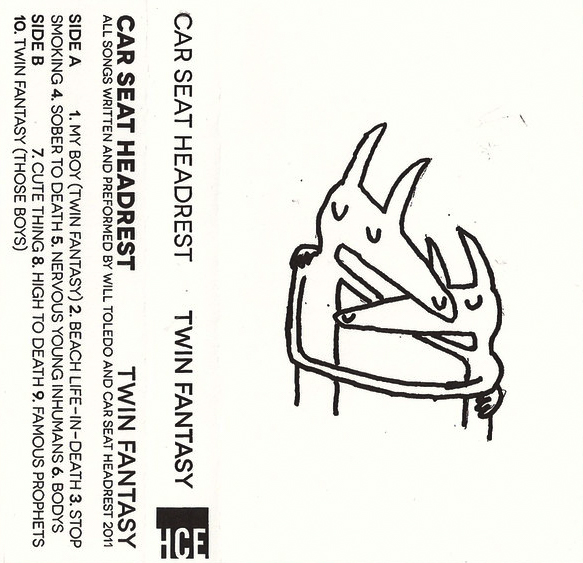
c/o discogs.com
The new Car Seat Headrest album, Twin Fantasy, is the sound of indie rock tearing itself apart. The album, released February 16 on Matador Records, arrives with a storied past. Initially begun as a solo project by Will Toledo while a student at William & Mary, Car Seat Headrest has been releasing music through Bandcamp since 2010. The act’s first four albums (named 1-4 in the order you would expect) came out within four months of each other. These early albums exhibit in quantity the ambition that Toledo would later direct toward quality. While Toledo has not maintained the album-per-month schedule of his first four albums, he has remained prolific. The original Twin Fantasy marked Toledo’s seventh release since his debut a year and a half prior. The 2011 version sounds much as one would expect of a bedroom indie rock solo act. Lo-fi production, unpolished vocal delivery, distorted haze reigning over the entire endeavor.
Seven years later, Toledo has remade the album with the current full-band lineup of Car Seat Headrest. One must admit that, beneath all the amateurishness of the original Twin Fantasy, Toledo had already worked out much of the thematic resonance and clarity of purpose that shine through on the new release. Given the title, Twin Fantasy, it’s unsurprising that the album deals with aesthetic and thematic dualities. Aesthetically, Toledo races between indie rock poles. His voice at times affects the I-just-rolled-out-of-bed-and-for-some-reason-there’s-a-microphone-in-front-of-me delivery of slacker artists, while at other times adopting the earnest, arena-ready belting of Bruce Springsteen cum Win Butler. The instrumentation likewise teeters between the passion-before-precision casualness of DIY indie and the subtlety, complexity, and ambition of more fussy acts like Broken Social Scene. The album is at once enamored with and bored by indie rock tropes. In “Bodys,” Toledo drawls, “Is it the chorus yet? No. It’s just a building of the verse, so when the chorus does come, it’ll be more rewarding.” Toledo is hyperaware of the conventions that he employs and later subverts.
Twin Fantasy’s layers of sonic nuance demonstrate a mastery of production. Many of these touches are new to the 2018 version of Twin Fantasy, subtitled Face to Face. The chorus of pre-release single “Cute Thing” features bubbling synthetic chromatic percussion. On “Nervous Young Inhumans,” an army of guitars drop in and out of the mix with effective subtlety, playing parts both melodic and expressive. Nowhere is Toledo’s ambition more evident than on the album’s two longest tracks. “Beach Life-in-Death” and “Famous Prophets (Stars)” clock in at around 13 and 16 minutes, respectively. Both tracks play like a mix between the cut-and-paste compositional technique of SMiLE-era Brian Wilson and the plot-like progressions of Springsteen’s mid-70s epics. While most indie acts are content to strum fuzzed-out guitars, Car Seat Headrest employ a more meticulous approach.

c/o pitchfork.com
The album’s thematic concerns are likewise structured around binaries. Ruminations on life and death, the self and the other, youth and maturity, human and inhuman permeate the album. To reflect these binaries, the album plays like a palindrome. The last song, “Twin Fantasy (Those Boys)” echoes the themes of the first, “My Boy (Twin Fantasy).” “High to Death” provides the contrary to “Sober to Death,” as well as containing the refrain “Keep smoking, we love you,” a response to the earlier song “Stop Smoking (We Love You).” “Famous Prophets (Stars)” repeats lyrics from “My Boy (Twin Fantasy),” the vocals distorted almost beyond comprehensibility. These musical and lyrical repetitions serve to highlight the difficulties of growing up and being in love. What seems tenable in youth appears unimaginable in adulthood. On the album closer, “Twin Fantasy (Those Boys),” Toledo sings of the eponymous boys, “They were connected at the back of the head / They got a conduit, their minds are the same.” For Toledo, love is a loss of the self. The binaries that Toledo sets up throughout much of the album collapse under the sway of intimacy. The album artwork, from artist Cate Wurtz, reflects this core tenet. Two crudely drawn figures embrace each other, composed of negative space as much as marks on the page, the nose of one as the eye of the other, bodies intertwined and bodies shared.
Not every experiment Toledo tries works. “Sober to Death” ends in a buildup that switches between 3/4 and 4/4 time. While emblematic of Toledo’s knack for injecting strangeness where less talented songwriters might shore up their songs with cliches, the intentionally disorienting coda fails to exhilarate. The album also retains many of the DIY touches that lent the original album humor and eccentricity, even if these elements sometimes detract from the listening experience. Perhaps the most egregious example is the second half of “Nervous Young Inhumans.” After the song proper concludes, Toledo spends the remaining two-and-a-half minutes monologuing over a minimal bass riff. These moments are not without their humor. Toledo complains of his time in Europe, “I can’t even go to IKEA anymore, I’ve got flashbacks!” But I nonetheless fear that these spoken word portions add nothing to the album beyond running time.
These flaws are minor in comparison to the achievement that Car Seat Headrest have wrought out of a roughly recorded but thoroughly conceptualized amateur album. Twin Fantasy employs musical repetition to create meaning in a way not often heard outside of musicals. In doing so, the album acquires a grandeur, accumulating meaning over its 72-minute runtime in a fashion more characteristic of film than popular music. Twin Fantasy (Face to Face) is the product of unrelenting ambition, an album obsessed with dualities that manage to present a compelling and coherent whole.
Marc Greenawalt can be reached at mgreenawalt@wesleyan.edu.
Comments are closed